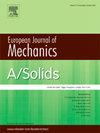Computationally efficient and noise resilient data-driven mechanics via a continuous data space
IF 4.4
2区 工程技术
Q1 MECHANICS
引用次数: 0
Abstract
In this study, a continuous data space driven computational mechanics framework that enhances the original data-driven methodology is presented. The traditional data-driven approach relies on finite, discrete datasets and direct projections between the dataset and the constraint space dictated by the problem settings. The use of a discrete dataset entails accuracy problems as the dataset is inherently subject to noise and outliers. Moreover, finding the optimal datapoint in the dataset is computationally demanding especially for large sized datasets and geometrically higher dimensional problems. The proposed framework addresses these limitations by leveraging a continuous data space constructed via Gaussian mixture modeling to replace the discrete dataset. The continuous data space can be interpreted as a data density field that can be used to assess the likelihood of a point capturing the underlying material behavior. Hence the effect of noise and outlier on the solution accuracy is reduced. By eliminating search queries in the discrete dataset, the computational cost is significantly reduced as well. Moreover, the data-to-constraint space projection is conducted efficiently via a search direction deduced from the continuous data space. Numerical experiments demonstrate the capability of the framework to enhance accuracy and computational efficiency.
通过一个连续的数据空间计算效率和噪声弹性数据驱动力学
在这项研究中,提出了一个连续数据空间驱动的计算力学框架,以增强原始的数据驱动方法。传统的数据驱动方法依赖于有限的、离散的数据集,以及数据集与问题设置所规定的约束空间之间的直接投影。使用离散数据集会带来准确性问题,因为数据集本质上受到噪声和异常值的影响。此外,在数据集中寻找最优数据点的计算要求很高,特别是对于大型数据集和几何高维问题。所提出的框架通过利用通过高斯混合建模构建的连续数据空间来取代离散数据集来解决这些限制。连续数据空间可以解释为一个数据密度场,可用于评估一个点捕获底层材料行为的可能性。从而降低了噪声和离群值对求解精度的影响。通过消除离散数据集中的搜索查询,计算成本也显著降低。此外,通过从连续数据空间推导出的搜索方向,有效地进行了数据到约束空间的投影。数值实验表明,该框架能够提高计算精度和计算效率。
本文章由计算机程序翻译,如有差异,请以英文原文为准。
求助全文
约1分钟内获得全文
求助全文
来源期刊
CiteScore
7.00
自引率
7.30%
发文量
275
审稿时长
48 days
期刊介绍:
The European Journal of Mechanics endash; A/Solids continues to publish articles in English in all areas of Solid Mechanics from the physical and mathematical basis to materials engineering, technological applications and methods of modern computational mechanics, both pure and applied research.

 求助内容:
求助内容: 应助结果提醒方式:
应助结果提醒方式:


